Charles E W Bean, Diaries, AWM38 3DRL 606/274/1 - 1918 - 1941 - Part 11

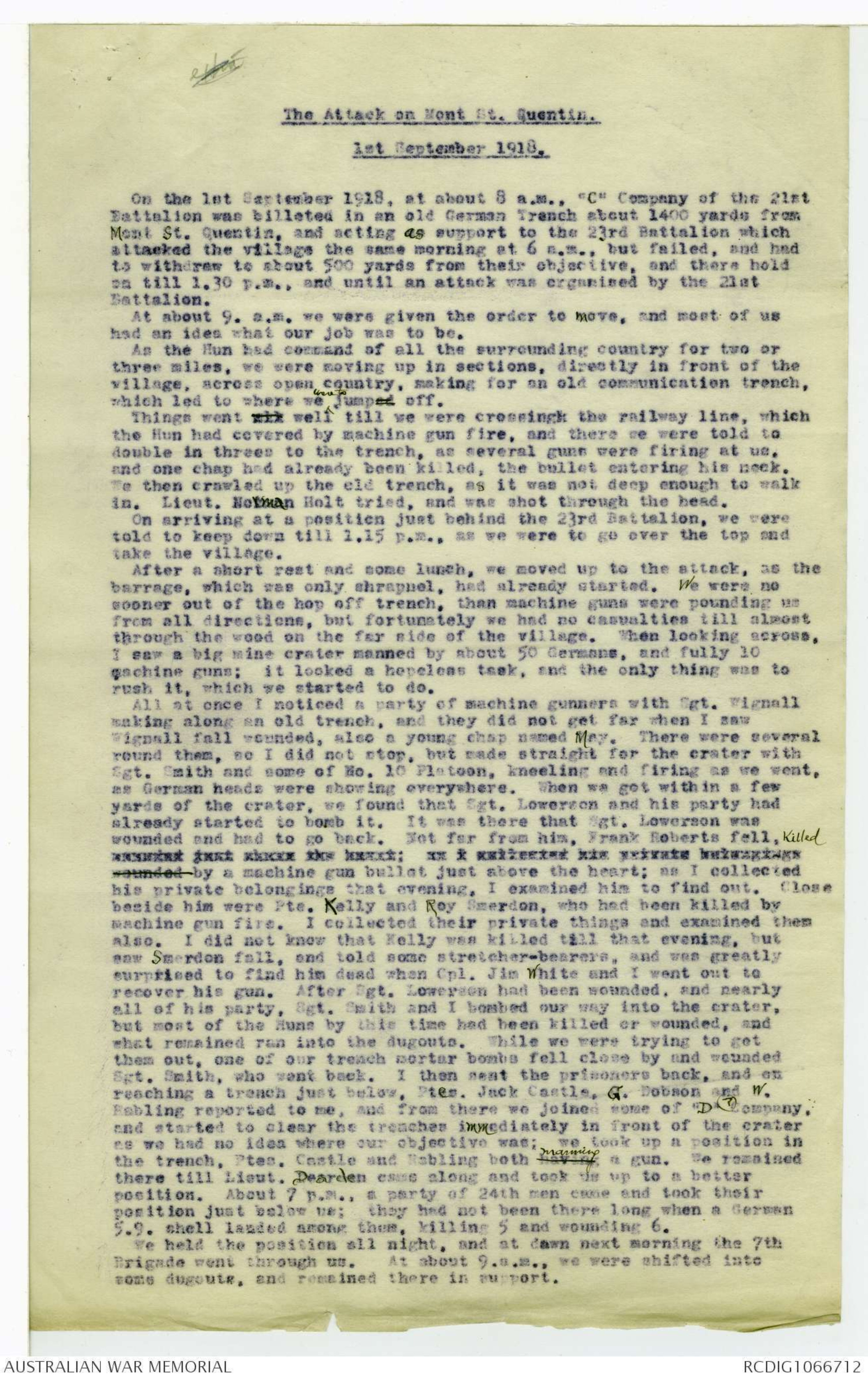
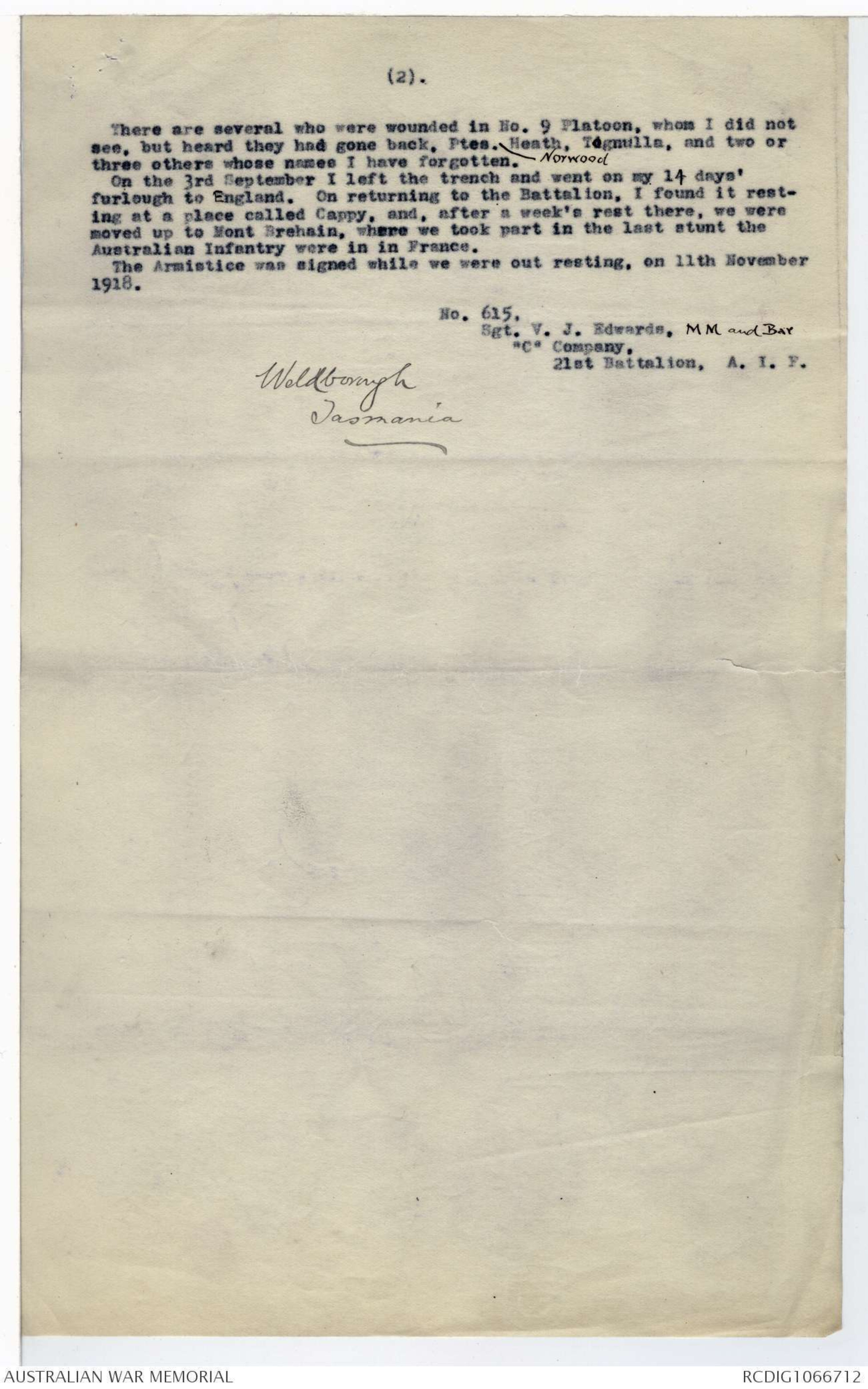
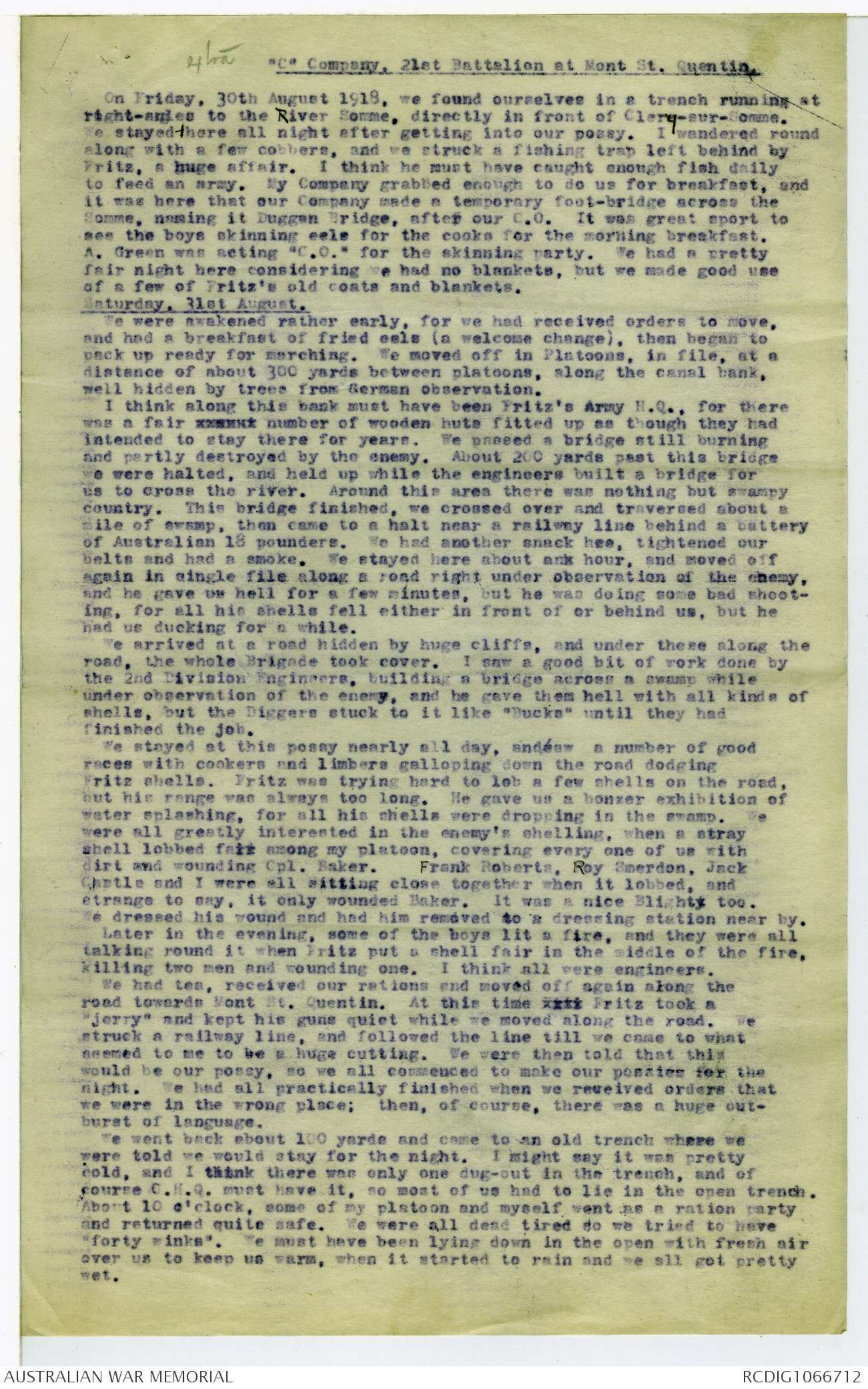
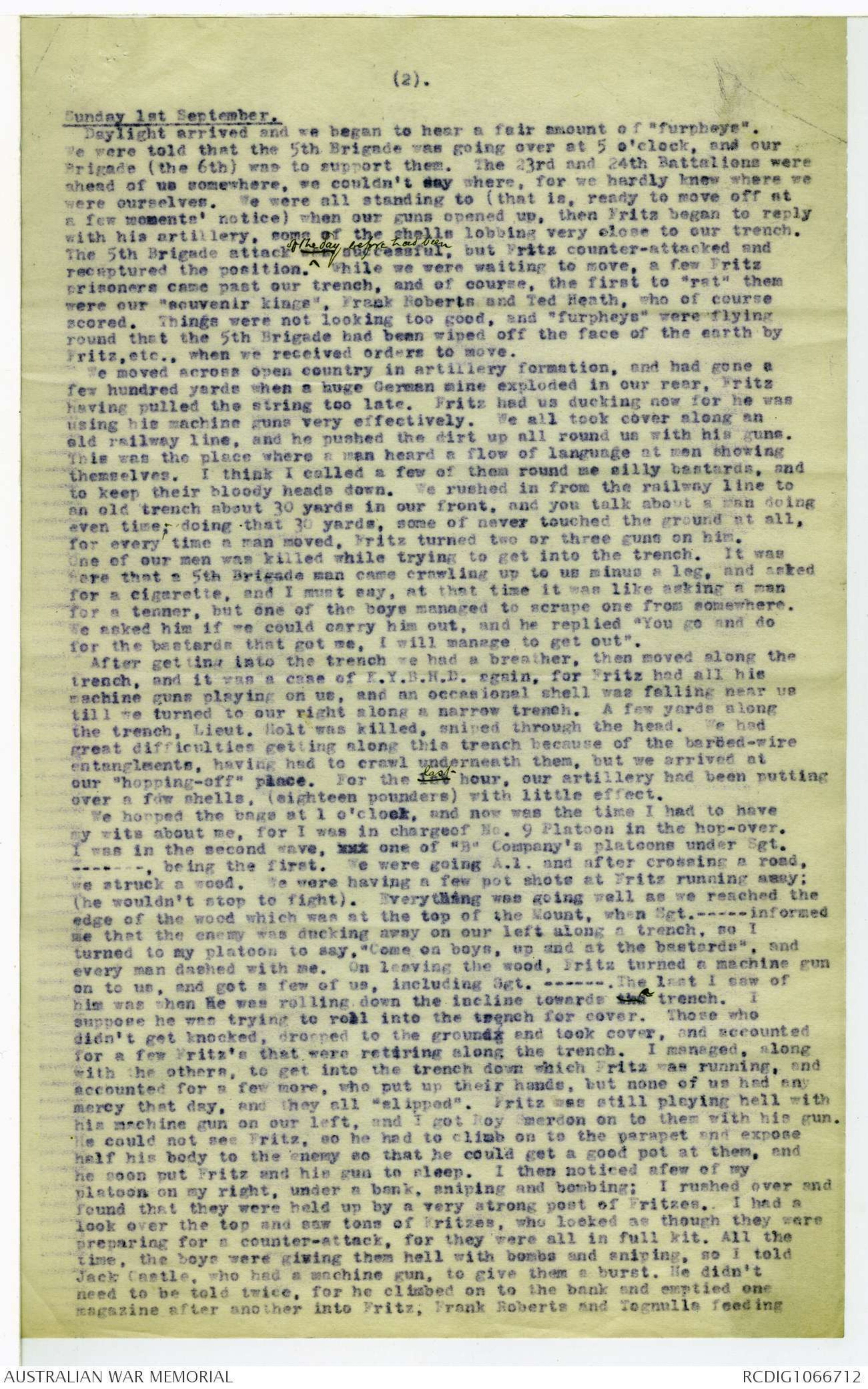
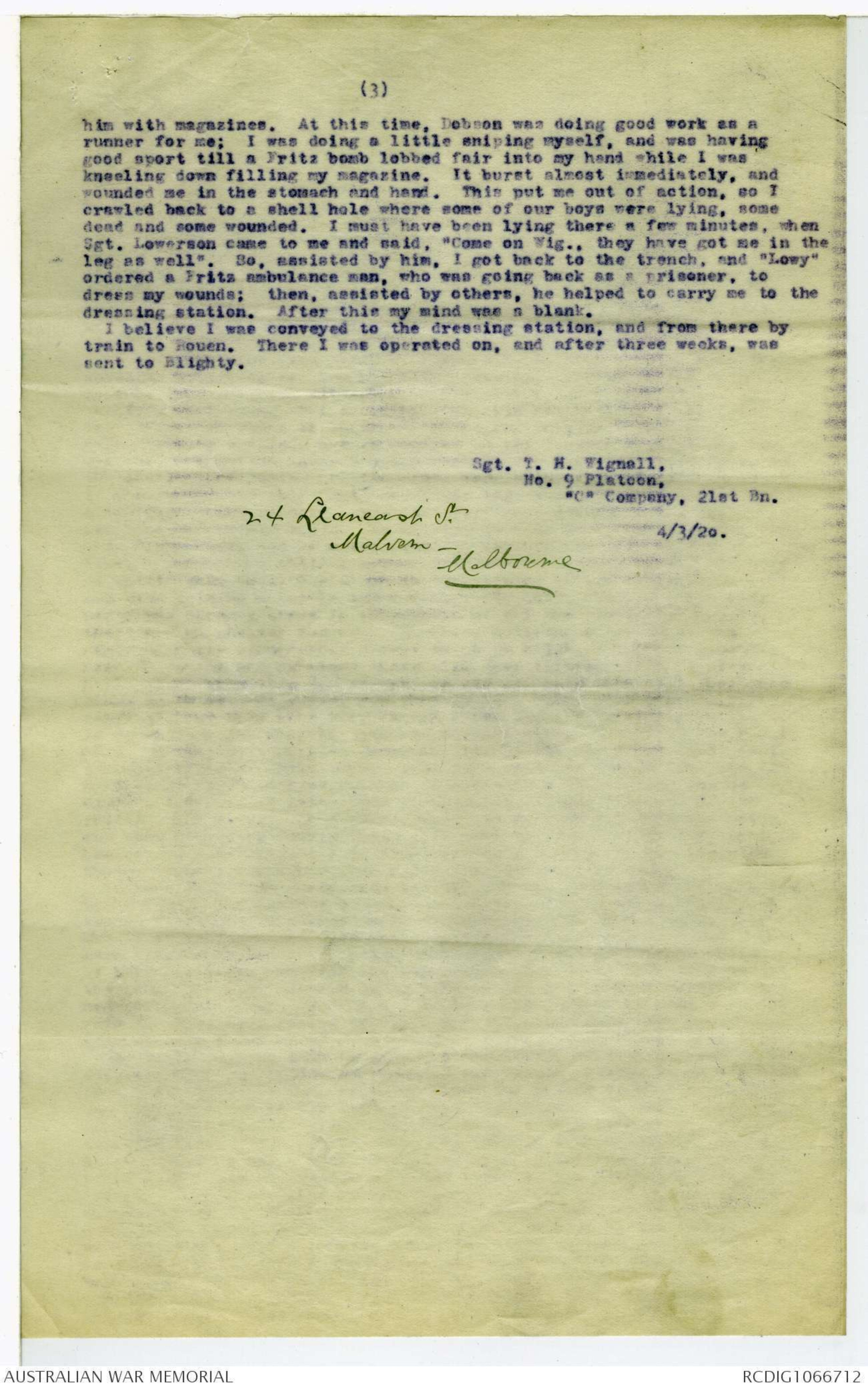
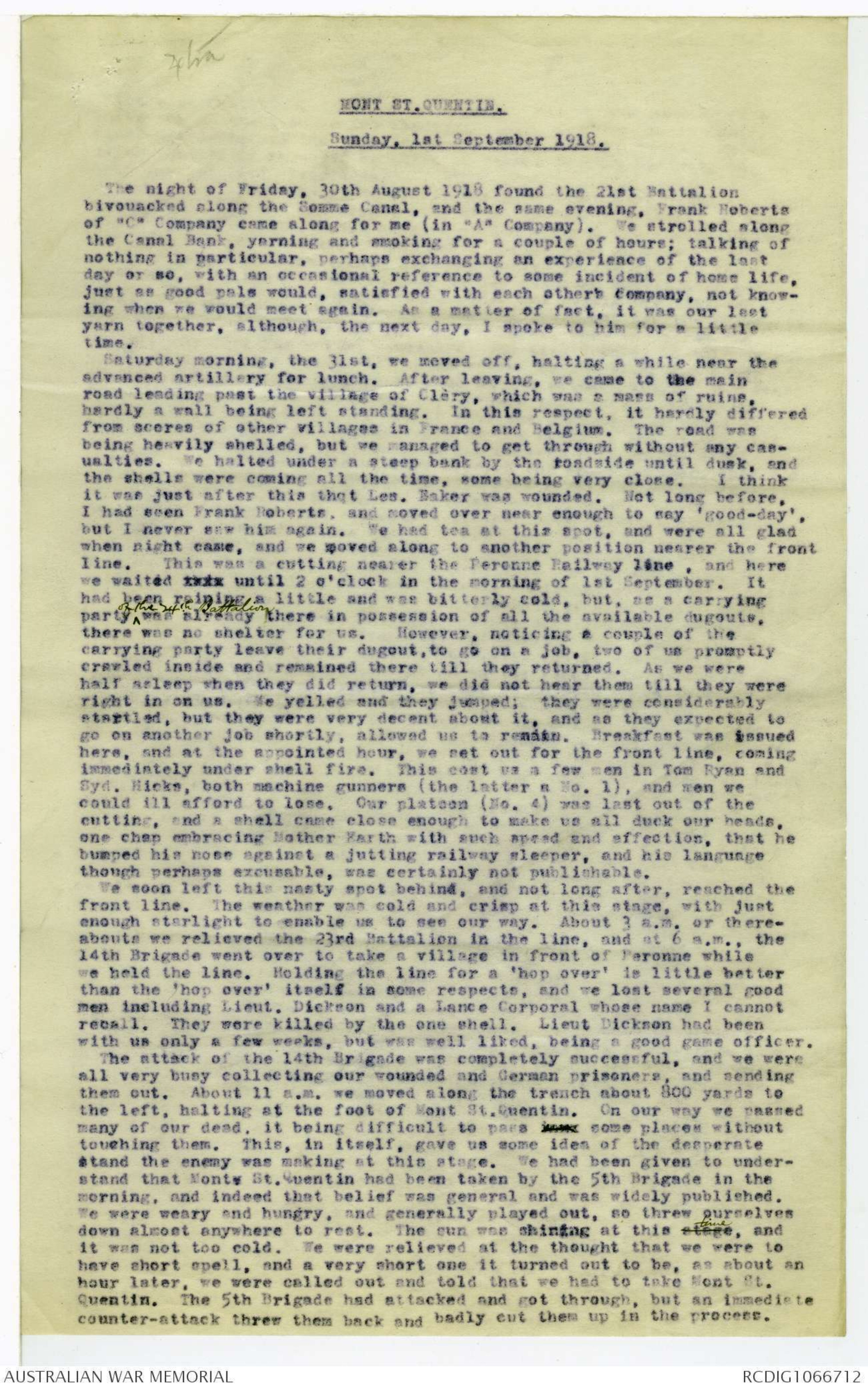
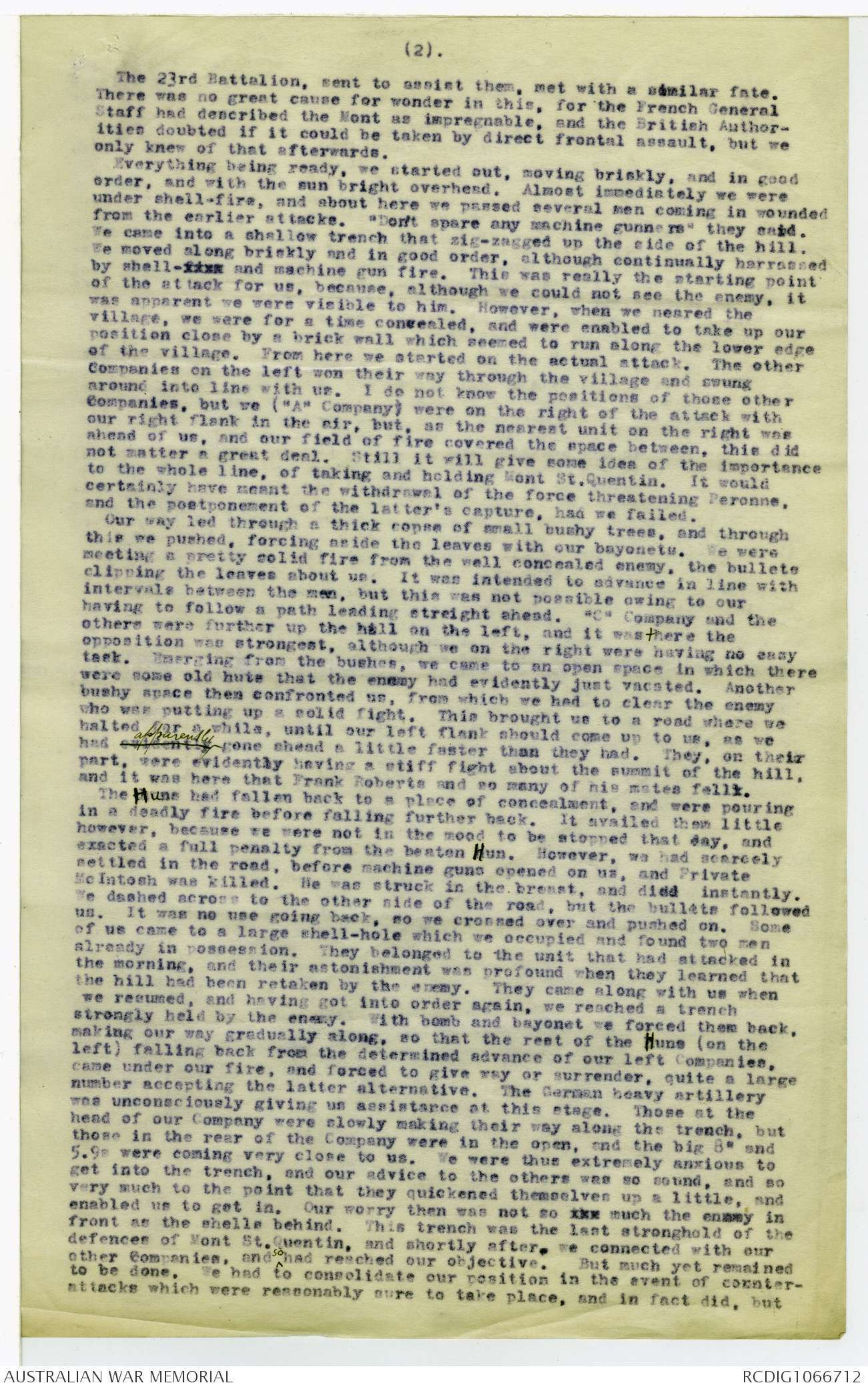
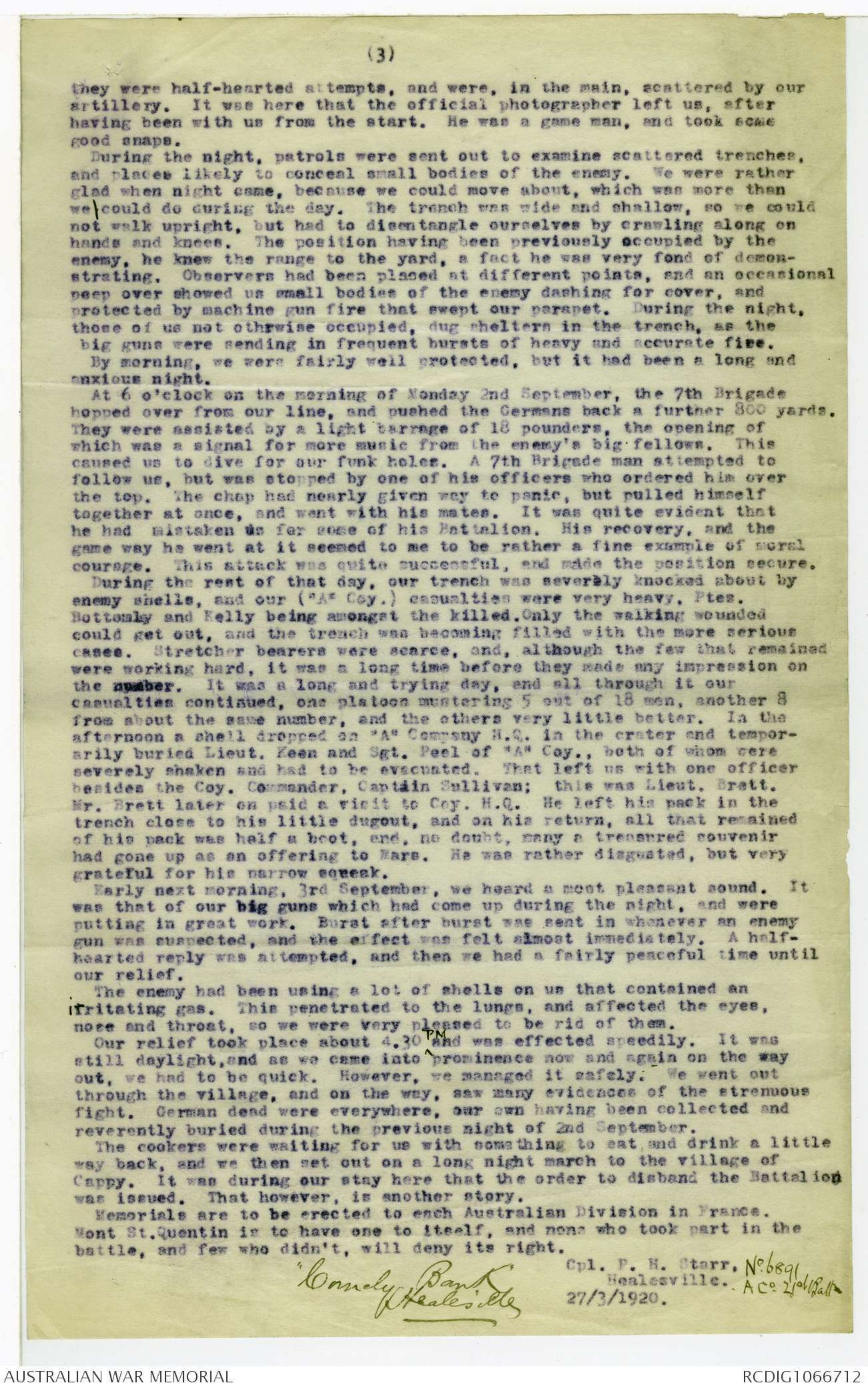
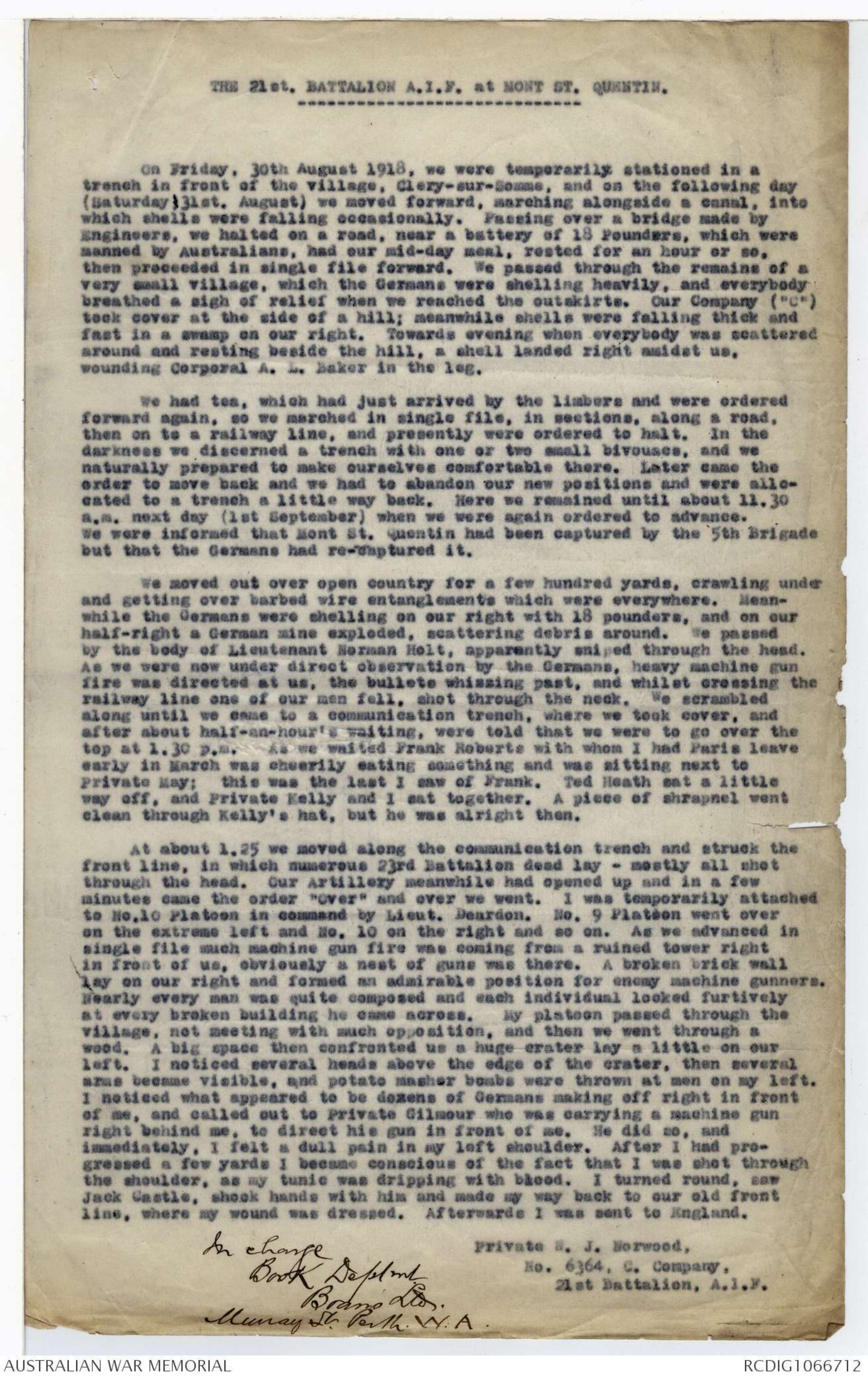
(3)
me, he said "I've got my issue, carry on".
Bert Bullus, another man who came with Sgt. Lowerson, was also
wounded in the leg, but refused to go out, saying "I want some
souvenirs off these bastards before I go".
With the assistance of others who had come along, we eventually
captured the position, taking fully 60 prisoners and 40 machine guns.
Just at this stage, we were joined by some men belonging to the
24th Battalion. They proceeded on round the Mo^unt and established
the line on the other side. But the main and hardest part of the
job had been accomplished. Thus ended the final effort in the
capture of Mont St.Quentin, which is now admitted to be one of the
finest and most wonderful feats of the war.
Pte. G. E. Dobson. M.M.
No. 9 Platoon,
"C" Company,
21st Battalion.
228 Banks St
Albert Park.
Melbourne
[*extra*]
The Attack on Mont St. Quentin.
1st September 1918.
On the 1st September 1918, at about 8 a.m., "C" Company of the 21st
Battalion was billeted in an old German Trench about 1400 yards from
Mont St. Quentin, and acting as support to the 23rd Battalion which
attacked the village the same morning at 6 a.m., but failed, and had
to withdraw to about 500 yards from their objective, and there hold
on till 1.30 p.m., and until an attack was organised by the 21st
Battalion.
At about 9. a.m. we were given the order to move, and most of us
had an idea what our job was to be.
As the Hun had command of all the surrounding country for two or
three miles, we were moving up in sections, directly in front of the
village, across open country, making for an old communication trench,
which led to where we ^were to jumped off.
Things went wkk well till we were crossingk the railway line, which
the Hun had covered by machine gun fire, and there we were told to
double in threes to the trench, as several guns were firing at us,
and one chap had already been killed, the bullet entering his neck.
We then crawled up the old trench, as it was not deep enough to walk
in. Lieut. Norman Holt tried, and was shot through the head.
On arriving at a position just behind the 23rd Battalion, we were
told to keep down till 1.15 p.m., as we were to go over the top and
take the village.
After a short rest and some lunch, we moved up to the attack, as the
barrage, which was only shrapnel, had already started. We were no
sooner out of the hop off trench, than machine guns were pounding us
from all directions, but fortunately we had no casualties till almost
through the wood on the far side of the village. When looking across,
I saw a big mine crater manned by about 50 Germans, and fully 10
machine guns; it looked a hopeless task, and the only thing was to
rush it, which we started to do.
All at once I noticed a party of machine gunners with Sgt. Wignall
making along an old trench, and they did not get far when I saw
Wignall fall wounded, also a young chap named May. There were several
round them, so I did not stop, but made straight for the crater with
Sgt. Smith and some of No. 10 Platoon, kneeling and firing as we went,
as German heads were showing everywhere. When we got within a few
yards of the crater, we found that Sgt. Lowerson and his party had
already started to bomb it. It was there that Sgt. Lowerson was
wounded and had to go back. Not far from him, Frank Roberts fell, killedwounded just above the heart; as I collected his private belongingswounded by a machine gun bullet just above the heart; as I collected
his private belongings that evening, I examined him to find out. Close
beside him were Pte. Kelly and Roy Smerdon, who had been killed by
machine gun fire. I collected their private things and examined them
also. I did not know that Kelly was killed till that evening, but
saw Smerdon fall, and told some stretcher-bearers, and was greatly
surprised to find him dead when Cpl. Jim White and I went out to
recover his gun. After Sgt. Lowerson had been wounded, and nearly
all of his party, Sgt. Smith and I bombed our way into the crater,
but most of the Huns by this time had been killed or wounded, and
what remained ran into the dugouts. While we were trying to get
them out, one of our trench mortar bombs fell close by and wounded
Sgt. Smith, who went back. I then sent the prisoners back, and on
reaching a trench just below, Ptes. Jack Castle, G. Dobson and W.
Rabling reported to me, and from there we joined some of "D" (?) Company,
and started to clear the trenches immediately in front of the crater
as we had no idea where our objective was; we took up a position in
the trench, Ptes. Castle and Rabling both having manning a gun. We remained
there till Lieut. Dearden came along and took us up to a better
position. About 7 p.m., a party of 24th men came and took their
position just below us; they had not been there long when a German
5.9. shell landed among them, killing 5 and wounding 6.
We held the position all night, and at dawn next morning the 7th
Brigade went through us. At about 9.a.m., we were shifted into
some dugouts, and remained there in support.
(2).
There are several who were wounded in No. 9 Platoon, whom I did not
see, but heard they had gone back, Ptes. Norwood Heath, Tegnulla, and two or
three others whose names I have forgotten.
On the 3rd September I left the trench and went on my 14 days'
furlough to England. On returning to the Battalion, I found it resting
at a place called Cappy, and, after a week's rest there, we were
moved up to Mont Brehain, where we took part in the last stunt the
Australian Infantry were in in France.
The Armistice was signed while we were out resting, on 11th November
1918.
No. 615.
Sgt. V. J. Edwards. MM and Bar
"C" Company,
21st Battalion, A. I. F.
Weldborough
Tasmania
[*extra*]
"C" Company, 21st Battalion at Mont St. Quentin.
On Friday, 30th August 1918, we found ourselves in a trench running at
right-angles to the River Somme, directly in front of Clery-sur-Somme.
We stayed there all night after getting into our possy. I wandered round
along with a few cobbers, and we struck a fishing trap left behind by
Fritz, a huge affair. I think he must have caught enough fish daily
to feed an army. My Company grabbed enough to do us for breakfast, and
it was here that our Company made a temporary foot-bridge across the
Somme, naming it Duggen Bridge, after our C.O. It was great sport to
see the boys skinning eels for the cooks for the morning breakfast.
A. Green was acting "C.O." for the skinning party. We had a pretty
fair night here considering we had no blankets, but we made good use
of a few of Fritz's old coats and blankets.
Saturday, 31st August.
We were awakened rather early, for we had received orders to move,
and had a breakfast of fried eels (a welcome change), then began to
pack up ready for marching. We moved off in Platoons, in file, at a
distance of about 300 yards between platoons, along the canal bank,
well hidden by trees from German observation.
I think along this bank must have been Fritz's Army H.Q., for there
was a fair amount number of wooden huts fitted up as though they had
intended to stay there for years. We passed a bridge still burning
and partly destroyed by the enemy. About 200 yards past this bridge
we were halted, and held up while the engineers built a bridge for
us to cross the river. Around this area there was nothing but swampy
country. This bridge finished, we crossed over and traversed about a
mile of swamp, then came to a halt near a railway line behind a battery
of Australian 18 pounders. We had another snack hre, tightened our
belts and had a smoke. We stayed here about and hour, and moved off
again in single file along a road right under observation of the enemy,
and he gave us hell for a few minutes, but he was doing some bad shooting,
for all his shells fell either in front of or behind us, but he
had us ducking for a while.
We arrived at a road hidden by huge cliffs, and under these along the
road, the whole Brigade took cover. I saw a good bit of work done by
the 2nd Division Engineers, building a bridge across a swamp while
under observation of the enemy, and he gave them hell with all kinds of
shells, but the Diggers stuck to it like "Bucks" until they had
finished the job.
We stayed at this possy nearly all day, and saw a number of good
races with cookers and limbers galloping down the road dodging
Fritz shells. Fritz was trying hard to lob a few shells on the road,
but his range was always too long. He gave us a bonzer exhibition of
water splashing, for all his shells were dropping in the swamp. We
were all greatly interested in the enemy's shelling, when a stray
shell lobbed fair among my platoon, covering every one of us with
dirt and wounding Cpl. Baker. Frank Roberts, Roy Smerdon, Jack
Castle and I were all sitting close together when it lobbed, and
strange to say, it only wounded Baker. It was a nice Blighty too.
We dressed his wound and had him removed to a dressing station near by.
Later in the evening, some of the boys lit a fire, and they were all
talking round it when Fritz put a shell fair in the middle of the fire,
killing two men and wounding one. I think all were engineers.
We had tea, received our rations and moved off again along the
road towards Mont St. Quentin. At this time Friz Fritz took a
"jerry" and kept his guns quiet while we moved along the road. We
struck a railway line, and followed the line till we came to what
seemed to me to be a huge cutting. We were then told that this
would be our possy, so we all commenced to make our possies for the
night. We had all practically finished when we received orders that
we were in the wrong place; then, of course, there was a huge outburst
of language.
We went back about 100 yards and came to an old trench where we
were told we would stay for the night. I might say it was pretty
cold, and I think there was only one dug-out in the trench, and of
course G.H.Q. must have it, so most of us had to lie in the open trench.
About 10 o'clock, some of my platoon and myself went as a ration party
and returned quite safe. We were all dead tired so we tried to have
"forty winks". We must have been lying down in the open with fresh air
over us to keep us warm, when it started to rain and we all got pretty
wet.
(2).
Sunday 1st September.
Daylight arrived and we began to hear a fair amount of "furpheys".
We were told that the 5th Brigade was going over at 5 o'clock, and our
Brigade (the 6th) was to support them. The 23rd and 24th Battalions were
ahead of us somewhere, we couldn't say where, for we hardly knew where we
were ourselves. We were all standing to (that is, ready to move off at
a few moments' notice) when our guns opened up, then Fritz began to reply
with his artillery, some of the shells lobbing very close to our trench.
The 5th Brigade attack was ^of the day before had been successful, but Fritz counter-attacked and
recaptured the position. While we were waiting to move, a few Fritz
prisoners came past our trench, and of course, the first to "rat" them
were our "souvenir kings", Frank Roberts and Ted Heath, who of course
scored. Things were not looking too good, and "furpheys" were flying
round that the 5th Brigade had been wiped off the face of the earth by
Fritz, etc., when we received orders to move.
We moved across open country in artillery formation, and had gone a
few hundred yards when a huge German mine exploded in our rear, Fritz
having pulled the string too late. Fritz had us ducking now for he was
using his machine guns very effectively. We all took cover along an
old railway line, and he pushed the dirt up all round us with his guns.
This was the place where a man heard a flow of language at men showing
themselves. I think I called a few of them round me silly bastards, and
to keep their bloody heads down. We rushed in from the railway line to
an old trench about 30 yards in our front, and you talk about a man doing
even time; doing that 30 yards, some of never touched the ground at all,
for every time a man moved, Fritz turned two or three guns on him.
One of our men was killed while trying to get into the trench. It was
here that a 5th Brigade man came crawling up to us minus a leg, and asked
for a cigarette, and I must say, at that time it was like asking a man
for a tenner, but one of the boys managed to scrape one from somewhere.
We asked him if we could carry him out, and he replied "You go and do
for the bastards that got me, I will manage to get out".
After getting into the trench we had a breather, then moved along the
trench, and it was a case of K.Y.B.N.D. again, for Fritz had all his
machine guns playing on us, and an occasional shell was falling near us
till we turned to our right along a narrow trench. A few yards along
the trench, Lieut. Holt was killed, sniped through the head. We had
great difficulties getting along this trench because of the barbed-wire
entanglments, having had to crawl underneath them, but we arrived at
our 'hopping-off" place. For the 1st last hour, our artillery had been putting
over a few shells, (eighteen pounders) with little effect.
We hopped the bags at 1 o'clock, and now was the time I had to have
my wits about me, for I was in chargeof No. 9 Platoon in the hop-over.
I was in the second wave, but one of "B" Company's platoons under Sgt.
----------, being the first. We were going A.1. and after crossing a road,
we struck a wood. We were having a few pot shots at Fritz running away;
(he wouldn't stop to fight). Everything was going well as we reached the
edge of the wood which was at the top of the Mount, when Sgt.-------- informed
me that the enemy was ducking away on our left along a trench, so I
turned to my platoon to say, "Come on boys, up and at the bastards", and
every man dashed with me. On leaving the wood, Fritz turned a machine gun
on to us, and got a few of us, including Sgt. --------. The last I saw of
him was when he was rolling down the incline towards the a trench. I
suppose he was trying to roll into the trench for cover. Those who
didn't get knocked, drooped to the groundg and took cover, and accounted
for a few Fritz's that were retiring along the trench. I managed, along
with the others, to get into the trench down which Fritz was running, and
accounted for a few more, who put up their hands, but none of us had any
mercy that day, and they all "slipped". Fritz was still playing hell with
his machine gun on our left, and I got Roy Smerdon on to them with his gun.
He could not see Fritz, so he had to climb on to the parapet and expose
half his body to the enemy so that he could get a good pot at them, and
he soon put Fritz and his gun to sleep. I then noticed afew of my
platoon on my right, under a bank, sniping and bombing: I rushed over and
found that they were held up by a very strong post of Fritzes. I had a
look over the top and saw tons of Fritzes, who looked as though they were
preparing for a counter-attack, for they were all in full kit. All the
time, the boys were giving them hell with bombs and sniping, so I told
Jack Castle, who had a machine gun, to give them a burst. He didn't
need to be told twice, for he climbed on to the bank and emptied one
magazine after another into Fritz; Frank Roberts and Tognulla feeding
(3)
him with magazines. At this time, Dobson was doing good work as a
runner for me; I was doing a little sniping myself, and was having
good sport till a Fritz bomb lobbed fair into my hand while I was
kneeling down filling my magazine. It burst almost immediately, and
wounded me in the stomach and hand. This put me out of action, so I
crawled back to a shell hole where some of our boys were lying, some
dead and some wounded. I must have been lying there a few minutes, when
Sgt. Lowerson came to me and said, "Come on Wig., they have got me in the
leg as well". So, assisted by him, I got back to the trench, and "Lowy"
ordered a Fritz amb;: then, assisted by others, he helped to carry me to the
dressing station. After this my mind was a blank.
I believe I was conveyed to the dressing station, and from there by
train to Rouen. There I was operated on, and after three weeks, was
sent to Blighty.
Sgt. T. H. Wignall,
No. 9 Platoon,
"C" Company, 21st Bn.
4/3/20.
24 Llaneast St
Malvern
Melbourne.
[*extra*]
MONT ST. QUENTIN.
Sunday, 1st September 1918.
The night of Friday, 30th August 1918 found the 2lst Battalion
bivouacked along the Somme Canal, and the same evening, Frank Roberts
of "C" Company came along for me (in "A" Company). We strolled along
the Canal Bank, yarning and smoking for a couple of hours; talking of
nothing in particular, perhaps exchanging an experience of the last
day or so, with an occasional reference to some incident of home life,
just as good pals would, satisfied with each others company, not knowing
when we would meet again. As a matter of fact, it was our last
yarn together, although, the next day, I spoke to him for a little
time.
Saturday morning, the 31st, we moved off, halting a while near the
advanced artillery for lunch. After leaving, we came to the main
road leading past the village of Clèry, which was a mass of ruins,
hardly a wall being left standing. In this respect, it hardly differed
from scores of other villages in France and Belgium. The road was
being heavily shelled, but we managed to get through without any casualties.
We halted under a steep bank by the roadside until dusk, and
the shells were coming all the time, some being very close. I think
it was just after this that Les. Baker was wounded. Not long before,
I had seen Frank Roberts, and moved over near enough to say 'good-day',
but I never saw him again. We had tea at this spot, and were all glad
when night came, and we moved along to another position nearer the front
line. This was a cutting nearer the Peronne Railway line, and here
we waited this until 2 o'clock in the morning of 1st September. It
had been raining a little and was bitterly cold, but, as a carrying
party ^of the 24th Battalion was already there in possession of all the available dugouts,
there was no shelter for us. However, noticing a couple of the
carrying party leave their dugout, to go on a job, two of us promptly
crawled inside and remained there till they returned. As we were
half asleep when they did return, we did not hear them till they were
right in on us. We yelled and they jumped; they were considerably
startled, but they were very decent about it, and as they expected to
go on another job shortly, allowed us to remain. Breakfast was issued
here, and at the appointed hour, we set out for the front line, coming
immediately under shell fire. This cost us a few men in Tom Ryan and
Syd. Hicks, both machine gunners (the latter a No. 1), and men we
could ill afford to lose. Our platoon (No. 4) was last out of the
cutting, and a shell came close enough to make us all duck our heads,
one chap embracing Mother Earth with such speed and affection, that he
bumped his nose against a jutting railway sleeper, and his language
though perhaps excusable, was certainly not publishable.
We soon left this nasty spot behind, and not long after, reached the
front line. The weather was cold and crisp at this stage, with just
enough starlight to enable us to see our way. About 3 a.m. or thereabouts
we relieved the 23rd Battalion in the line, and at 6 a.m., the
14th Brigade went over to take a village in front of Peronne while
we held the line. Holding the line for a 'hop over' is little better
than the 'hop over' itself in some respects, and we lost several good
men including Lieut. Dickson and a Lance Corporal whose name I cannot
recall. They were killed by the one shell. Lieut Dickson had been
with us only a few weeks, but was well liked, being a good game officer.
The attack of the 14th Brigade was completely successful, and we were
all very busy collecting our wounded and German prisoners, and sending
them out. About 11 a.m. we moved along the trench about 800 yards to
the left, halting at the foot of Mont St.Quentin. On our way we passed
many of our dead, it being difficult to pass imm some places without
touching them. This, in itself, gave us some idea of the desperate
stand the enemy was making at this stage. We had been given to understand
that Montv. St. Quentin had been taken by the 5th Brigade in the
morning, and indeed that belief was general and was widely published.
We were weary and hungry, and generally played out, so threw ourselves
down almost anywhere to rest. The sun was shining at this stage time, and
it was not too cold. We were relieved at the thought that we were to
have short spell, and a very short one it turned out to be, as about an
hour later, we were called out and told that we had to take Mont St.
Quentin. The 5th Brigade had attacked and got through, but an immediate
counter-attack threw them back and badly cut them up in the process.
(2).
The 23rd Battalion, sent to assist then, met with a similar fate.
There was no great cause for wonder in this, for the French General
Staff had described the Mont as impregnable, and the British Authorities
doubted if it could be taken by direct frontal assault, but we
only knew of that afterwards.
Everything being ready, we started out, moving briskly, and in good
order, and with the sun bright overhead. Almost immediately we were
under shell-fire, and about here we passed several men coming in wounded
from the earlier attacks. "Don't spare any machine gunners" they said.
We came into a shallow trench that zig-zagged up the side of the hill.
We moved along briskly and in good order, although continually harrassed
by shell-fire and machine gun fire. This was really the starting point
of the attack for us, because, although we could not see the enemy, it
was apparent we were visible to him. However, when we neared the
village, we were for a time concealed, and were enabled to take up our
position close by a brick wall which seemed to run along the lower edge
of the village. From here we started on the actual attack. The other
Companies on the left won their way through the village and swung
around into line with us. I do not know the positions of those other
companies, but we ("A" Company) were on the right of the attack with
our right flank in the air, but, as the nearest unit on the right was
ahead of us, and our field of fire covered the space between, this did
not matter a great deal. Still it will give some idea of the importance
to the whole line, of taking and holding Mont St .Quentin. It would
certainly have meant the withdrawal of the force threatening Peronne,
and the postponement of the latter's capture, had we failed.
Our way led through a thick copse of small bushy trees, and through
this we pushed, forcing aside the leaves with our bayonets. We were
meeting a pretty solid fire from the well concealed enemy, the bullets
clipping the leaves about us. It was intended to advance in line with
intervals between the men, but this was not possible owing to our
having to follow a path leading straight ahead. "C" Company and the
others were further up the hill on the left, and it was there the
opposition was strongest, although we on the right were having no easy
task. Emerging from the bushes, we came to an open space in which there
were some old huts that the enemy had evidently just vacated. Another
bushy space then confronted us, from which we had to clear the enemy
who was putting up a solid fight. This brought us to a road where we
halted for a while, until our left flank should come up to us, as we
had evidently apparently gone ahead a little faster than they had. They, on their
part, were evidently having a stiff fight about the summit of the hill,
and it was here that Frank Roberts and so many of his mates felll.
The Huns had fallen back to a place of concealment, and were pouring
in a deadly fire before falling further back. It availed them little
however, because we were not in the mood to be stopped that day, and
exacted a full penalty from the beaten Hun. However, we had scarcely
settled in the road, before machine guns opened on us, and Private
McIntosh was killed. He was struck in the breast, and died instantly.
We dashed across to the other side of the road, but the bullets followed
us. It was no use going back, so we crossed over and pushed on. Some
of us came to a large shell-hole which we occupied and found two men
already in possession. They belonged to the unit that had attacked in
the morning, and their astonishment was profound when they learned that
the hill had been retaken by the enemy. They came along with us when
we resumed, and having got into order again, we reached a trench
strongly held by the enemy. With bomb and bayonet we forced them back,
making our way gradually along, so that the rest of the Huns (on the
left) falling back from the determined advance of our left Companies,
came under our fire, and forced to give way or surrender, quite a large
number accepting the latter alternative. The German heavy artillery
was unconsciously giving us assistance at this stage. Those at the
head of our Company were slowly making their way along the trench, but
those in the rear of the Company were in the open, and the big 8" and
5.9s were coming very close to us. We were thus extremely anxious to
get into the trench, and our advice to the others was so sound, and so
very much to the point that they quickened themselves up a little, and
enabled us to get in. Our worry then was not so the much the enemy in
front as the shells behind. This trench was the last stronghold of the
defences of Mont St.Quentin, and shortly after, we connected with our
other companies, and ^so had reached our objective. But much yet remained
to be done. We had to consolidate our position in the event of counter-attacks
which were reasonably sure to take place, and in fact did, but
(3)
they were half-hearted attempts, and were, in the main, scattered by our
artillery. It was here that the official photographer left us, after
having been with us from the start. He was a game man, and took some
good snaps.
During the night, patrols were sent out to examine scattered trenches,
and places likely to conceal small bodies of the enemy. We were rather
glad when night came, because we could move about, which was more than
we could do during the day. The trench was wide and shallow, so we could
not walk upright, but had to disentangle ourselves by crawling along on
hands and knees. The position having been previously occupied by the
enemy, he knew the range to the yard, a fact he was very fond of demonstrating.
Observers had been placed at different points, and an occasional
peep over showed us small bodies of the enemy dashing for cover, and
protected by machine gun fire that swept our parapet. During the night,
those of us not othrwise occupied, dug shelters in the trench, as the
big guns were sending in frequent bursts of heavy and accurate fire.
By morning, we were fairly well protected, but it had been a long and
anxious night.
At 6 o'clock on the morning of Monday 2nd September, the 7th Brigade
hopped over from our line, and pushed the Germans back a further 800 yards.
They were assisted by a light barrage of 18 pounders, the opening of
which was a signal for more music from the enemy's big fellows. This
caused us to dive for our funk holes. A 7th Brigade man attempted to
follow us, but was stopped by one of his officers who ordered him over
the top. The chap had nearly given way to panic, but pulled himself
together at once, and went with his mates. It was quite evident that
he had mistaken us for some of his Battalion. His recovery, and the
game way he went at it seemed to me to be rather a fine example of moral
courage. This attack was quite successful, and made the position secure.
During the rest of that day, our trench was severely knocked about by
enemy shells, and our ("A" Coy.) casualties were very heavy. Ptes.
Bottomley and Kelly being amongst the killed. Only the walking wounded
could get out, and the trench was becoming filled with the more serious
cases. Stretcher bearers were scarce, and, although the few that remained
were working hard, it was a long time before they made any impression on
the number. It was a long and trying day, and all through it our
casualties continued, one platoon mustering 5 out of 18 men, another 8
from about the same number, and the others very little better. In the
afternoon a shell dropped on "A" Company H.Q. in the crater and temporarily
buried Lieut. Keen and Sgt. Peel of "A" Coy., both of whom were
severely shaken and had to be evecuated. That left us with one officer
besides the Coy. Commander, Captain Sullivan; this was Lieut. Brett.
Mr. Brett later on paid a visit to Coy. H.Q. He left his pack in the
trench close to his little dugout, and on his return, all that remained
of his pack was half a boot, and, no doubt, many a treasured souvenir
had gone up as an offering to Wars. He was rather disgusted, but very
grateful for his narrow squeak.
Early next morning, 3rd September, we heard a most pleasant sound. It
was that of our big guns which had come up during the night, and were
putting in great work. Burst after burst was sent in whenever an enemy
gun was suspected, and the effect was felt almost immediately. A half-hearted
reply was attempted, and then we had a fairly peaceful time until
our relief.
The enemy had been using a lot of shells on us that contained an
irritating gas. This penetrated to the lungs, and affected the eyes,
nose and throat, so we were very pleased to be rid of them.
Our relief took place about 4.30 ^PM and was effected speedily. It was
still daylight, and as we came into prominence now and again on the way
out, we had to be quick. However, we managed it safely. We went out
through the village, and on the way, saw many evidences of the strenuous
fight. German dead were everywhere, our own having been collected and
reverently buried during the previous night of 2nd September.
The cookers were waiting for us with somsthing to eat, and drink a little
way back, and we then set out on a long night march to the village of
Cappy. It was during our stay here that the order to disband the Battalion
was issued. That however, is another story.
Memorials are to be erected to each Australian Division in France.
Mont St.Quentin is to have one to itself, and none who took part in the
battle, and few who didn't, will deny its right.
Cpl. P. H. Starr,
Healesville. A Co 21st Battn
27/3/1920.
[*No. 6891*]
[*A Co 21stBattn*]
"Comely Bank"
Healesville
- THE 21st. BATTALION A.I.F. at MONT ST. QUENTIN.
On Friday, 30th August 1918, we were temporarily stationed in a
trench in front of the village, Clery-sur-Somme, and on the following day
(Saturday)31st. August) we moved forward, marching alongside a canal, into
which shells were falling occasionally. Passing over a bridge made by
Engineers, we halted on a road, near a battery of 18 Pounders, which were
manned by Australians, had our mid-day meal, rested for an hour or so,
then proceeded in single file forward. We passed through the remains of a
very small village, which the Germans were shelling heavily, and everybody
breathed a sigh of relief when we reached the outskirts. Our Company ("C")
took cover at the side of a hill; meanwhile shells were falling thick and
fast in a swamp on our right. Towards evening when everybody was scattered
around and resting beside the hill, a shell landed right amidst us,
wounding Corporal A. L. Baker in the leg.
We had tea, which had just arrived by the limbers and were ordered
forward again, so we marched in single file, in sections, along a road,
then on to a railway line, and presently were ordered to halt. In the
darkness we discerned a trench with one or two small bivouacs, and we
naturally prepared to make ourselves comfortable there. Later came the
order to move back and we had to abandon our new positions and were allocated
to a trench a little way back. Here we remained until about 11.30
a.m. next day (1st September) when we were again ordered to advance.
We were informed that Mont St. Quentin had been captured by the 5th Brigade
but that the Germans had re-captured it.
We moved out over open country for a few hundred yards, crawling under
and getting over barbed wire entanglements which were everywhere. Meanwhile
the Germans were shelling on our right with 18 pounders, and on our
half-right a German mine exploded, scattering debris around. We passed
by the body of Lieutenant Norman Holt, apparently sniped through the head.
As we were now under direct observation by the Germans, heavy machine gun
fire was directed at us, the bullets whizzing past, and whilst crossing the
railway line one of our men fell, shot through the neck. We scrambled
along until we came to a communication trench, where we took cover, and
after about half-an-hour's waiting, were told that we were to go over the
top at 1.30 p.m. As we waited Frank Roberts with whom I had Paris leave
early in March was cheerily eating something and was sitting next to
Private May; this was the last I saw of Frank. Ted Heath sat a little
way off, and Private Kelly and I sat together. A piece of shrapnel went
clean through Kelly's hat, but he was alright then.
At about 1.25 we moved along the communication trench and struck the
front line, in which numerous 23rd Battalion dead lay - mostly all shot
through the head. Our Artillery meanwhile had opened up and in a few
minutes came the order "Over" and over we went. I was temporarily attached
to No.10 Platoon in command by Lieut. Deardon. No. 9 Platoon went over
on the extreme left and No. 10 on the right and so on. As we advanced in
single file much machine gun fire was coming from a ruined tower right
in front of us, obviously a nest of guns was there. A broken brick wall
lay on our right and formed an admirable position for enemy machine gunners.
Nearly every man was quite composed and each individual looked furtively
at every broken building he came across. My platoon passed through the
village, not meeting with much opposition, and then we went through a
wood. A big space then confronted us a huge crater lay a little on our
left. I noticed several heads above the edge of the crater, then several
arms became visible, and potato masher bombs were thrown at men on my left.
I noticed what appeared to be dozens of Germans making off right in front
of me, and called out to Private Gilmour who was carrying a machine gun
right behind me, to direct hie gun in front of me. He did so, and
immediately, I felt a dull pain in my left shoulder. After I had progressed
a few yards I became conscious of the fact that I was shot through
the shoulder, as my tunic was dripping with blood. I turned round, saw
Jack Castle, shook hands with him and made my way back to our old front
line, where my wound was dressed. Afterwards I was sent to England.
Private N. J. Norwood,
No. 6364, C. Company,
21st Battalion, A.I.F.
In charge
Book Deptmt
Brano Ltd.
Murray St Perth. W. A.
 Sam scott
Sam scottThis transcription item is now locked to you for editing. To release the lock either Save your changes or Cancel.
This lock will be automatically released after 60 minutes of inactivity.